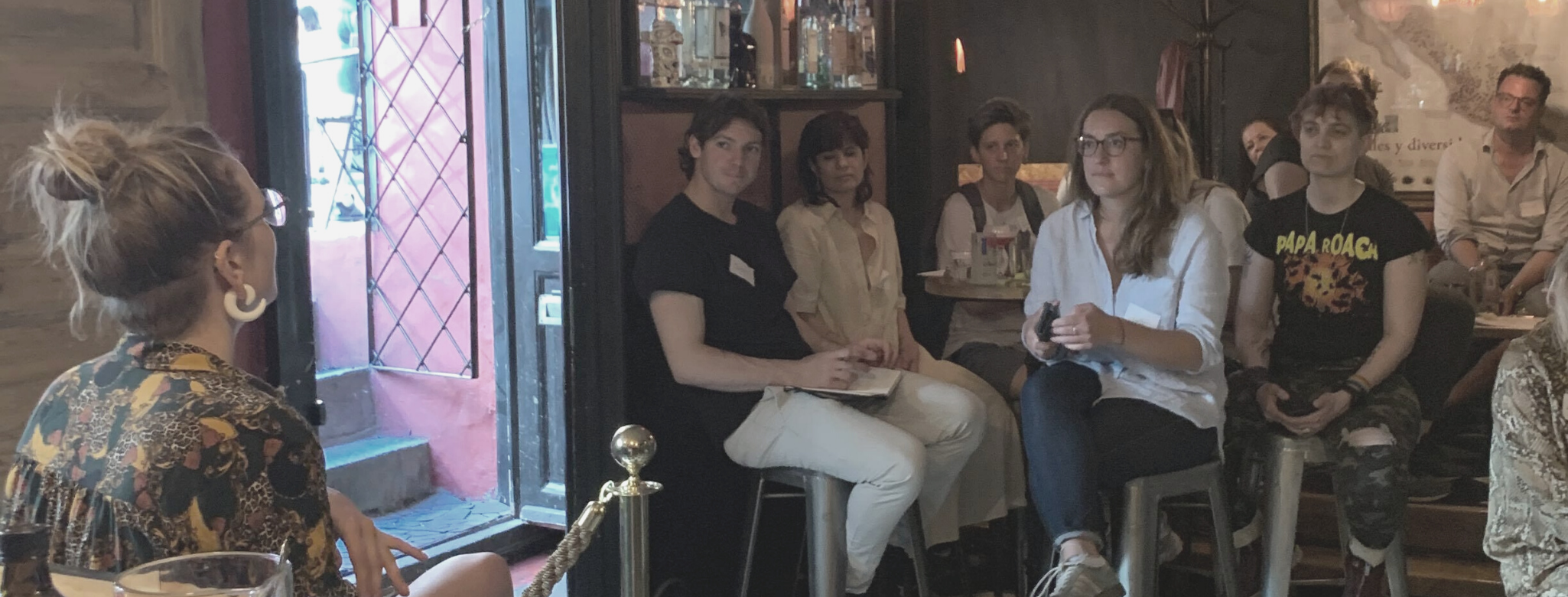
On June 20th, entrepreneurs, hospitality professionals, innovators, foodies and doers gathered for an intimate networking event to co-create possible solutions for the future of bartending.
Innovation never occurs in isolation. That was the idea that prompted Liquid Matters to team up with Nordic FoodTech Podcast, a podcast spotlighting people creating the future through food, to co-host our first-ever industry event. The Barking Dog kindly agreed to open their doors to us, and at 4 pm we kicked off the night with lightning talks from hospitality professionals presenting key issues within our industry.
By now, everyone has understood that you can repurpose coffee grinds and extract flavour from citrus peels, but implementing this as common knowledge and practice has taken years to achieve. At this rate, we as an industry simply aren't contributing enough to the efforts of minimising climate change. At the same time, the bar and hospitality industry is a tough environment to be in. Working hours are long, labour is intense, work-life balance is constantly challenged, and issues like mental health, substance abuse and discrimination make it challenging to motivate employees to contribute to the change.
Ieva Z, Restaurant Manager for Aamanns 1921, talked about the challenge of securing a healthy work environment within an industry that few consider an apt career choice. "Hospitality is an industry with a lot of waves," she pointed out. "You go from extremely busy shifts to extremely slow shifts, but you still have to perform with the same energy throughout." This coupled with a low hourly rate, very little job security and a murky and most times invisible path for career progression results in a high number of undevoted students taking up service jobs. At the same time, due to the past year's uncertainties, many dedicated full-timers have altogether left the industry for other opportunities.
Hardeep Singh Rehal, Winner of this year's Diageo World Class Danish finals, highlighted initiatives and pitfalls relating to minimising waste within the bar. "We are slaves to the tradition," he said. "It's an industry with a hierarchy. The excuse for not doing something is 'this is how we've always done it', and the problem is that no one is challenging the more experienced bartender or manager," he said.
For most business owners, adapting to and implementing new ideas, business models and processes are "risky, time-consuming and expensive," said Hardeep. "You may convince them that those two hours extra of prep is better for the environment, but if you can't show them the cost-benefit, they will never listen to you." Ieva agreed with this, saying that "it's always a question of budget", and that more often than not, the reluctance to change established norms relates back to owners' reluctance to shake off old habits.
So how do we break with tradition? What tools are available for the bar industry to streamline innovation and change the mindset of their venue and the industry bottom-up? Those were some of the questions presented to the groups. And after 20 intense minutes of discussions, three tangible ideas saw the light of day.
If you can quantify the greatness of your idea, how can anyone say no to it?
For business owners that only have revenue and profit in mind, the solution to change is simple: show them the damn money. One way to do this is with optimised spreadsheet templates that can accurately calculate staffable hours needed, the percentage of waste and cost-benefit on any given idea or product. For any idea you put in, you will be able to calculate and compare it to current spendings, waste etc. This coupled with a weekly 15-minute formal gathering where staff are encouraged to brainstorm on and share ideas to be tested in the spreadsheet could also help to engage employees in the process of improving processes within the venue and create a sense of ownership.
One bartender's trash, another bartender's gold.
Spreadsheets are great, but why limit waste management to one single venue or process? Imagine Too Good To Go paired with a service and utility exchange, aimed 100% at B2B. A sustainability swap shop for the industry focused on one single digital platform.
Bars can donate their waste and allocate it to where it can best be utilised, for example with another bar or company. With a digital platform, any business can put their waste, excess produce or similar up for grabs and thus provide a free resource for bars, restaurants and similar to tap into. Include farmers, distilleries and breweries in the community, and suddenly you have a free platform for new business connections, collaborations and utility providers. A distillery may agree to lend their facilities for a bar looking to experiment and share the profit generated from the sales of the output product. Or a farmer growing elderflower can invite bars to come and pick excess crops before the season is over.
This kind of cross-industry circularity has already been adapted on various levels by certain startups. For example beverage company BRØL, who collects excess produce and food waste to create beverages. The used hops from their beer are then used by a soap manufacturing company. Another example is GRIM who collects vegetables "too ugly to sell at the supermarket" and pack them in subscription-based weekly vegetable boxes. Not to forget Too Good To Go.
When it comes to the planet, sharing is indeed caring. If we want to be viewed as serious professionals, we must kill the notion that recipes are "sacred" and begin focusing on knowledge as the key value to provide guests, whether it relates to flavour, product knowledge or sustainability. With an open and inclusive B2B community platform, bars can easily gain access to local produce, ideas and creative input from within and beyond the industry. Essentially, it's an open-source platform for sharing recipes, tips, tricks, tools, natural produce, processes and more. The only question is what platform and how soon can we get it going?
Resilience through education
Denmark doesn't have a bartending school, but it has multiple institutions educating hospitality professionals where bartending and drinks are incorporated into the curriculum. These days, where hospitality venues are crying for staff, it is an untapped resource for talent.
However, it is common knowledge in the industry that driven and hard-working Danes are practically non-existent these days. Our industry is dominated by foreign workers, and the younger generations are less keen on working hard and for long hours. But precisely for this reason, bars should be involved with educational institutions to improve curriculum, set up internship deals and motivate the right talent to seek out the industry. And whilst we may all be badmouthing EBS, the matter of the fact is that venue owners and managers will know exactly what kind of training and knowledge an EBS student has gone through. If we as an industry collaborate with educational institutions, we can take the lead on guaranteeing that the right knowledge, the right attitude and the right image is showcased to the next generation of dedicated hospitality professionals.
The suggestion: To appoint 4-5 industry ambassadors, who would visit the schools, do presentations on bartending and cocktails, and work with the educators to improve and adapt the curriculum. If we can achieve this, we are already in a better position to attract new talent.
So...now what?
Liquid Matters is here to provide the space for co-creation and ideation, and if necessary, we will happily facilitate change. If you feel inspired by this article and wish to take the lead on realising some of these ideas, by all means, go ahead, and feel free to include us in the process. The beauty of the suggested ideas is that they are actionable, and Liquid Matters intend to provide the support to ensure that they are carried out.
If you want to co-host a co-creative event with Liquid Matters to further explore solutions to industry problems, then feel free to get in touch via [email protected].
NOTE: Many more needs and suggestions were highlighted, but these were the three ideas that showed a clear potential, and that had actionable and measurable potential.
